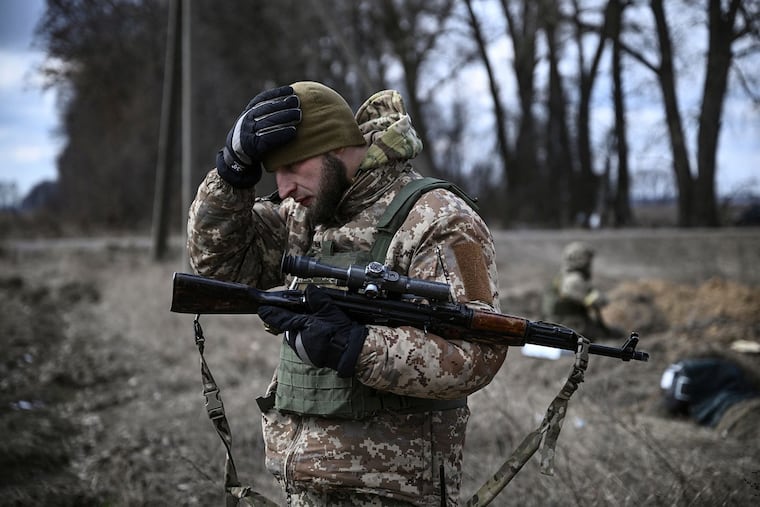U.S. firms that leave Russia have a lot more at stake than just money
Companies pulling out of Russia have put moral and political concerns ahead of profit. Tough decisions await, however, should Putin remain in power after the Ukraine invasion.

“The business of business is business.” That famous quote from Nobel Prize winning economist Milton Friedman implies that companies should maximize profits and let the owners of capital do with that wealth as they please. Businesses should stay away from doing good unless those activities lead to doing well.
Yes, most corporations no longer subscribe strictly to that credo. But in the face of Russia’s invasion of Ukraine, the willingness to risk earnings to make a moral and political statement is being tested.
The invasion has forced international corporations to reconsider doing business with Russian firms, individuals and/or the Russian government. CEOs must decide whether they should continue those relationships not just during the war, but afterward, as well.
» READ MORE: Vanguard stopped buying Russian stocks. AmerisourceBergen said it’s still supporting patients in drug trials there
Making money in Russia or with Russian companies has become problematic on so many levels. The business relationships may have been lucrative, but they now carry great risk, not just financially, but also in terms of corporate image. Firms are cutting ties and in doing so, earning good press.
While government and regulatory sanctions make it largely impossible for some firms to continue operations, most moves have been taken willingly.
The list of companies suspending ties is long and spans a spectrum of industries. Energy companies are limiting or ending purchases of products and abandoning long-term capital projects. Travel firms are bypassing Russia. Financial companies have reduced funding activities and moved to prevent the usage of their products, such as credit cards and cash transfers. Vehicle and aircraft companies have halted production and shipments. Major consumer goods companies have cut back or suspended sales. Delivery companies have stopped sending packages to Russia.
There is even a “no fry zone” in Russia; shorthand for McDonald’s decision to temporary shutter its hundreds of restaurants in the country.
Sometimes, firms slip up and don’t understand there is a potential trade-off between corporate image and the short and long-term financial impact of certain actions. It can be a painful lesson to learn that the two overlap.
Consider an example. Shell Oil announced that it was severing ties with its Russian supplier, creating a massive write-off. But then it indicated it would continue purchasing oil from Russian suppliers until it can find replacement product.
In an energy-shortage world, that could take a long time and when it was discovered the company had purchased oil on the spot market, the blowback was massive. The risk to corporate image forced Shell to stop that practice. Shell relearned that image and finance go hand-in-hand.
» READ MORE: Lukoil boycott takes off in Philly amid calls to ban all Russian oil imports
This example raise sticky questions: How do companies respond not just in the current situation, but maybe, of more importance, what do they do if Russian President Vladimir Putin remains in power? Will the outrage be temporary or will permanent business changes be implemented?
The Conference Board, a nonpartisan, business-directed organization, has provided guidance on approaching the trade-off between business and social concerns when it comes to Russia. It published a paper, “Cutting Ties With Russia: A Guide to Decision-Making Now and in the Future.”
In the paper, there is no simple answer to the question: “What should companies do?” The suggestion is that everything, including financial, social, image, company culture, and regulatory concerns, must be weighed.
But the report does say this: “Cutting ties with Russia may have significantly greater business and financial implications than taking a stand on a social issue, which means the interests of stockholders should factor in more prominently in the analysis.”
The report also contains a warning that companies should be prepared “for sustained retaliation by a nation state in cybersecurity or other arenas.”
That brings us to the last concern: Putin. What should companies do if Putin remains in control of Russia. Can firms resume business as usual? If they do, what does that say about current decisions to act against Russia?
If Putin loses his grip on power, the decision becomes easier. Unless the new Russian leadership restricts firms that suspended activities, most companies would likely attempt to resurrect their Russian business. That is why most companies did not announce permanent changes.
The corporate world has, to a large extent, stepped up to the plate in the face of Putin’s war. But let’s not go overboard in congratulating them. Those companies that made more permanent changes to their business relationships with Russia should be applauded for putting their (and their stakeholders’) money where their mouths are.
But for those that have hedged their bets, it is what they do over the next months or years that matter. For them, the jury is still out on whether they made decisions representative of their social and moral concerns, or they took the path that protected their standing in the short-term so they could ensure their long-run earnings.
Joel L. Naroff is president of Naroff Economics in Bucks County.